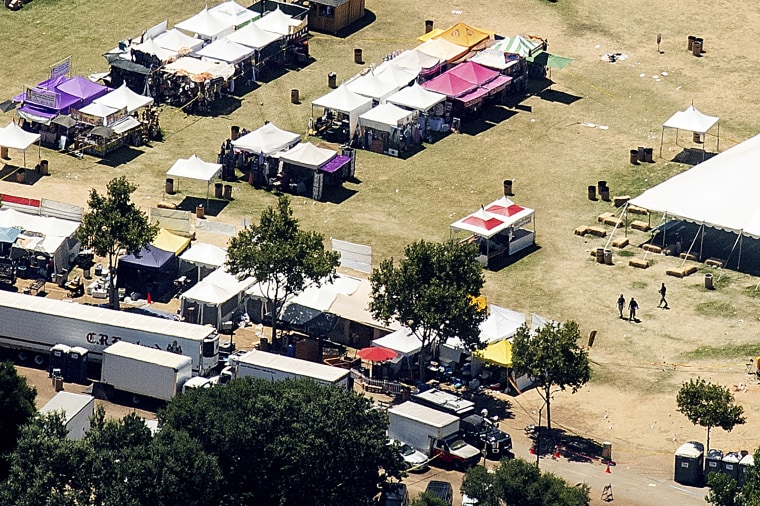There was little more that authorities could do to protect the Gilroy Garlic Festival from a determined attacker, authorities and witnesses said Monday, saying there's a reason that events like the gathering where three people were shot to death in Northern California on Sunday are called "soft targets."
Authorities said William Santino Legan, 19, knew that security was going to be tight at the event, one of the largest food festivals in the United States, drawing tens of thousands of visitors every year.
"Honestly, security was great," said Julissa Contreras, a witness who said she's a former police cadet.
Contreras said in an interview that the gunman "planned around security, with security in mind."
"He was completely prepared for what he was doing," she said, adding: "I've been to music festivals with more lax security. And so I really think this was just a fluke."
Police said Legan bypassed phalanxes of security workers, equipped with metal detectors who searched bags at every entrance. He approached through a wilderness area abutting Christmas Hill Park at the back of the festival area, where he cut through the fence using some sort of tool he'd brought with him for just that purpose.
Police, FBI personnel and security patrols were moving through the crowd during the festival, said Craig Fair, deputy special agent in charge of the FBI's San Francisco field office.
That's why, when the calls of gunfire came in, officers were able to confront Legan and shoot him in less than a minute, Gilroy Police Chief Scot Smithee said.
"Law enforcement, they weren't good — they were great," California Gov. Gavin Newsom said at a news conference on Monday.
For law enforcement, an event like the Gilroy Garlic Festival is a target that's impossible to secure perfectly: It's easily accessible, it attracts a large crowd of people and it's a scheduled event that an attacker can plan for.
Download the NBC News app for breaking news.
The U.S. Department of Homeland Security, or DHS, calls such sites ST-CPs — Soft Targets and Crowded Places. It says they're places that are "vulnerable to attack using simple tactics and readily available weapons."
In guidance to local law enforcement agencies, DHS specifically lists festivals as vulnerable targets, along with shopping centers, sports venues, civic spaces and other "special events."
Read the Department of Homeland Security's most recent guidance on securing soft targets.
They're a significant security challenge because "highly lethal attacks" can be executed "with little planning or expertise and are often able to remain undetected until operational," DHS says.
That leaves organizers of events like the Gilroy Garlic Festival to conduct a balancing act: They can strictly limit who can get in, where they can go and what they can do, or they can accept the risk inherent in letting people enjoy themselves.
Especially after a gunman killed 58 people at an outdoor music festival in Las Vegas in 2017, that debate was put into sharp focus. But security experts said that in many cases, it might not be worth dampening a gala atmosphere that welcomes thousands of attendees year after year. If you lock things down too tightly, they said, you could kill the event.
Given the huge number of events like the Gilroy Garlic Festival across the country every weekend of the year, shootings remain statistically rare, and Fair said Monday that "it's up to those events" to determine how far they want to go.
"The cornerstone our democracy is a free and open society where citizens can enjoy a wide range of activities without fear of harm," DHS says.
"Segments of our society are inherently open to the general public, and by nature of their purpose do not incorporate strict security measures."

